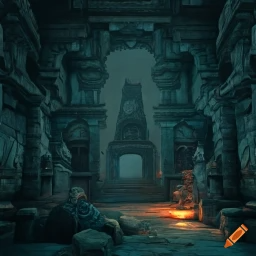I’ve often heard people joke (or lament) that no one actually reads the DMG. While the Player’s Handbook contains most of the moment-to-moment rules of the game, and the Monster Manual is the obvious source for populating sessions with antagonists, the Dungeon Master’s Guide is a weird jumble of adjudication advice, worldbuilding, optional rules, and miscellaneous tools. I’ll admit that I myself rarely referenced the book (beyond the magic item section) in my early years with the game. Digging deeper revealed some strange material that I certainly did not investigate back when 5E was fresh.
Consider the Dungeon Master’s Workshop, the section of the 2014 5E DMG that endeavors to introduce readers to hacking and modifying the game. It provides sample rules from the useful (variant rules for initiative and resting) to the superfluous (alien technology) to the undercooked (morale and sanity rules).
One of the most intriguing optional rules is buried in the “Plot Points” section on page 269. Plot points are a currency that allows players to alter the game world in ways that would typically be limited to the DM’s purview. This is interesting as it goes, but not especially novel; various other systems use similar mechanics, like Fate’s fate points.
The part that I found specifically interesting was “Option 3: The Gods Must Be Crazy”:
“With this approach, there is no permanent DM. Everyone makes a character, and one person starts as the DM and runs the game as normal. That person's character becomes an NPC who can tag along with the group or remain on the sidelines, as the group wishes.
At any time, a player can spend a plot point to become the DM. That player's character becomes an NPC, and play continues. It's probably not a good idea to swap roles in the middle of combat, but it can happen if your group allows time for the new DM to settle into his or her role and pick up where the previous DM left off.
Using plot points in this way can make for an exciting campaign as each new DM steers the game in unexpected directions. This approach is also a great way for would-be DMs to try running a game in small, controlled doses.
In a campaign that uses plot points this way, everyone should come to the table with a bit of material prepared or specific encounters in mind. A player who isn't prepared or who doesn't feel like DMing can choose to not spend a plot point that session.”
Uh… What?
This is quite possibly the weirdest rule in the D&D 5E.14 books; insofar as we define “weird” as furthest from the baseline experience of playing D&D. When I asked on Discord if anyone knew where the idea came from, Justin Alexander suggested that it might have originated in the 2001 RPG Rune by Robin D. Laws, which includes such a rule; even the game’s very brief Wikipedia page mentions the GM-switching feature.
It sounds reasonable to me that one of the D&D writers remembered Rune when working on 5E and used it as inspiration. I haven't played Rune, so I can't say how well this feature is executed there; but I have some qualms with its presentation as an alternative rule in D&D. For example, I doubt that this is actually a “great way for would-be DMs to try running a game in small, controlled doses.” I’ve played in a game where the DM role switched at predetermined junctures, and even that was quite complex, without accounting for a mechanic that could fundamentally change the game's trajectory at any time. The implicit expectation that the active DM both honor the prior gameplay and set the stage for subsequent actions by other DMs is a whole other dimension of complexity to consider. Would-be DMs are better supported through running one-shots or other low-stakes games where they can feel more comfortable making mistakes.
The idea that people should come to the table with “specific encounters in mind” is also a landmine. Modern D&D struggles enough with inflexible encounter building even when a single, traditional DM is running the game on the straight and narrow.
It makes no damn sense. Compels me though.
I think this idea would have a better shot in a lighter ruleset. Both of the issues I note above are at least partially ameliorated in a rules-light game with a low-prep or no-prep baseline. So where does that take us?





No comments:
Post a Comment